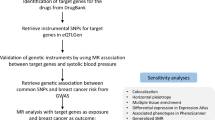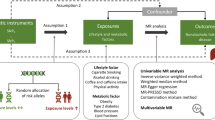Abstract
Adiponectin produced by adipose tissue, which is involved in complex diseases related to obesity, such as cancer. Genetic variations in ADIPOQ are thought to influence the activity of adiponectin, thus relating to cancer occurrence. However, epidemiological results were inconsistent. To examine this controversy, we assessed reported studies of association between ADIPOQ polymorphisms and cancer risk. Relevant studies were selected by PUBMED, EMBASE update to January 12th, 2012. According to the acceptance and exclusion criteria, 15 studies involved three polymorphisms (rs266729, rs2241766, rs1501299) of ADIPOQ were included. Summary odds ratio (ORs) and 95 % confidence intervals (CIs) were calculated using random-effect or fixed-effect models based on the heterogeneity of included studies. A total of 15 case–control studies related rs266729 (5,615 cases and 6,425 controls), rs2241766 (5,318 cases and 6,118 controls) and rs1501299 (3,751 cases and 5,104 controls) were included to analyze the ADIPOQ polymorphisms and cancer risk. For rs1501299, T allele was associated with decreased cancer risk. In addition, cancer type subgroup analysis revealed T allele was associated with decreased colorectal and prostate cancer risk. Ethnicity subgroup analysis observed a decreased risk in both Asian and Caucasian descendents. As to rs2241766, a borderline decreased cancer risk was observed. This meta-analysis indicated T allele of rs1501299 was an obvious protection factor for cancer risk, and G allele of rs2241766 was a potential protection factor for cancer risk, especially in Caucasian descendents. Further studies should be performed to clarify the roles of ADIPOQ polymorphisms in the cancer risk.






Similar content being viewed by others
References
Pharoah PD, Dunning AM, Ponder BA, Easton DF (2004) Association studies for finding cancer-susceptibility genetic variants. Nat Rev Cancer 4(11):850–860. doi:10.1038/nrc1476
Khandekar MJ, Cohen P, Spiegelman BM (2011) Molecular mechanisms of cancer development in obesity. Nat Rev Cancer 11(12):886–895. doi:10.1038/nrc3174
Kadowaki T, Yamauchi T (2005) Adiponectin and adiponectin receptors. Endocr Rev 26(3):439–451. doi:10.1210/er.2005-0005
Beebe-Dimmer JL, Zuhlke KA, Ray AM, Lange EM, Cooney KA (2010) Genetic variation in adiponectin (ADIPOQ) and the type 1 receptor (ADIPOR1), obesity and prostate cancer in African Americans. Prostate Cancer Prostatic Dis 13(4):362–368. doi:10.1038/pcan.2010.27
Pechlivanis S, Bermejo JL, Pardini B, Naccarati A, Vodickova L, Novotny J, Hemminki K, Vodicka P, Forsti A (2009) Genetic variation in adipokine genes and risk of colorectal cancer. Eur J Endocrinol 160(6):933–940. doi:10.1530/EJE-09-0039
Kaklamani VG, Wisinski KB, Sadim M, Gulden C, Do A, Offit K, Baron JA, Ahsan H, Mantzoros C, Pasche B (2008) Variants of the adiponectin (ADIPOQ) and adiponectin receptor 1 (ADIPOR1) genes and colorectal cancer risk. JAMA 300(13):1523–1531. doi:10.1001/jama.300.13.1523
Partida-Perez M, de la Luz Ayala-Madrigal M, Peregrina-Sandoval J, Macias-Gomez N, Moreno-Ortiz J, Leal-Ugarte E, Cardenas-Meza M, Centeno-Flores M, Maciel-Gutierrez V, Cabrales E, Cervantes-Ortiz S, Gutierrez-Angulo M (2010) Association of LEP and ADIPOQ common variants with colorectal cancer in Mexican patients. Cancer Biomark 7(3):117–121. doi:10.3233/CBM-2010-0154
He B, Pan Y, Zhang Y, Bao Q, Chen L, Nie Z, Gu L, Xu Y, Wang S (2011) Effects of genetic variations in the adiponectin pathway genes on the risk of colorectal cancer in the Chinese population. BMC Med Genet 12:94. doi:10.1186/1471-2350-12-94
Yi N, Kaklamani VG, Pasche B (2011) Bayesian analysis of genetic interactions in case-control studies, with application to adiponectin genes and colorectal cancer risk. Ann Hum Genet 75(1):90–104. doi:10.1111/j.1469-1809.2010.00605.x
Kaklamani V, Yi N, Zhang K, Sadim M, Offit K, Oddoux C, Ostrer H, Mantzoros C, Pasche B (2011) Polymorphisms of ADIPOQ and ADIPOR1 and prostate cancer risk. Metabolism 60(9):1234–1243. doi:10.1016/j.metabol.2011.01.005
Moore SC, Leitzmann MF, Albanes D, Weinstein SJ, Snyder K, Virtamo J, Ahn J, Mayne ST, Yu H, Peters U, Gunter MJ (2009) Adipokine genes and prostate cancer risk. Int J Cancer 124(4):869–876. doi:10.1002/ijc.24043
Dhillon PK, Penney KL, Schumacher F, Rider JR, Sesso HD, Pollak M, Fiorentino M, Finn S, Loda M, Rifai N, Mucci LA, Giovannucci E, Stampfer MJ, Ma J (2011) Common polymorphisms in the adiponectin and its receptor genes, adiponectin levels and the risk of prostate cancer. Cancer Epidemiol Biomarkers Prev 20(12):2618–2627. doi:10.1158/1055-9965.EPI-11-0434
Kaklamani VG, Sadim M, Hsi A, Offit K, Oddoux C, Ostrer H, Ahsan H, Pasche B, Mantzoros C (2008) Variants of the adiponectin and adiponectin receptor 1 genes and breast cancer risk. Cancer Res 68(9):3178–3184. doi:10.1158/0008-5472.CAN-08-0533
Teras LR, Goodman M, Patel AV, Bouzyk M, Tang W, Diver WR, Feigelson HS (2009) No association between polymorphisms in LEP, LEPR, ADIPOQ, ADIPOR1, or ADIPOR2 and postmenopausal breast cancer risk. Cancer Epidemiol Biomarkers Prev 18(9):2553–2557. doi:10.1158/1055-9965.EPI-09-0542
Wolk A, Gridley G, Svensson M, Nyren O, McLaughlin JK, Fraumeni JF, Adam HO (2001) A prospective study of obesity and cancer risk (Sweden). Cancer Causes Control 12(1):13–21
Luo Z, Saha AK, Xiang X, Ruderman NB (2005) AMPK, the metabolic syndrome and cancer. Trends Pharmacol Sci 26(2):69–76. doi:10.1016/j.tips.2004.12.011
Davis RJ (2000) Signal transduction by the JNK group of MAP kinases. Cell 103(2):239–252. doi:10.1016/S0092-8674(00)00116-1
Handoll HH (2006) Systematic reviews on rehabilitation interventions. Arch Phys Med Rehabil 87(6):875. doi:10.1016/j.apmr.2006.04.006
Midgette AS, Wong JB, Beshansky JR, Porath A, Fleming C, Pauker SG (1994) Cost-effectiveness of streptokinase for acute myocardial infarction: a combined meta-analysis and decision analysis of the effects of infarct location and of likelihood of infarction. Med Decis Making 14(2):108–117
Egger M, Davey Smith G, Schneider M, Minder C (1997) Bias in meta-analysis detected by a simple, graphical test. BMJ 315(7109):629–634
Cui E, Deng A, Wang X, Wang B, Mao W, Feng X, Hua F (2011) The role of adiponectin (ADIPOQ) gene polymorphisms in the susceptibility and prognosis of non-small cell lung cancer. Biochem Cell Biol 89(3):308–313. doi:10.1139/o11-005
Qi L, Doria A, Manson JE, Meigs JB, Hunter D, Mantzoros CS, Hu FB (2006) Adiponectin genetic variability, plasma adiponectin, and cardiovascular risk in patients with type 2 diabetes. Diabetes 55(5):1512–1516
Heid IM, Wagner SA, Gohlke H, Iglseder B, Mueller JC, Cip P, Ladurner G, Reiter R, Stadlmayr A, Mackevics V, Illig T, Kronenberg F, Paulweber B (2006) Genetic architecture of the APM1 gene and its influence on adiponectin plasma levels and parameters of the metabolic syndrome in 1,727 healthy Caucasians. Diabetes 55(2):375–384
Gonzalez-Sanchez JL, Zabena CA, Martinez-Larrad MT, Fernandez-Perez C, Perez-Barba M, Laakso M, Serrano-Rios M (2005) An SNP in the adiponectin gene is associated with decreased serum adiponectin levels and risk for impaired glucose tolerance. Obes Res 13(5):807–812. doi:10.1038/oby.2005.91
Fujisawa T, Endo H, Tomimoto A, Sugiyama M, Takahashi H, Saito S, Inamori M, Nakajima N, Watanabe M, Kubota N, Yamauchi T, Kadowaki T, Wada K, Nakagama H, Nakajima A (2008) Adiponectin suppresses colorectal carcinogenesis under the high-fat diet condition. Gut 57(11):1531–1538. doi:10.1136/gut.2008.159293
Tilg H, Moschen AR (2006) Adipocytokines: mediators linking adipose tissue, inflammation and immunity. Nat Rev Immunol 6(10):772–783. doi:10.1038/nri1937
Al Khaldi RM, Al Mulla F, Al Awadhi S, Kapila K, Mojiminiyi OA (2011) Associations of single nucleotide polymorphisms in the adiponectin gene with adiponectin levels and cardio-metabolic risk factors in patients with cancer. Dis Markers 30(4):197–212. doi:10.3233/DMA-2011-0775
Doecke JD, Zhao ZZ, Stark MS, Green AC, Hayward NK, Montgomery GW, Webb PM, Whiteman DC (2008) Single nucleotide polymorphisms in obesity-related genes and the risk of esophageal cancers. Cancer Epidemiol Biomarkers Prev 17(4):1007–1012. doi:10.1158/1055-9965.EPI-08-0023
Carvajal-Carmona LG, Spain S, Kerr D, Houlston R, Cazier JB, Tomlinson I (2009) Common variation at the adiponectin locus is not associated with colorectal cancer risk in the UK. Hum Mol Genet 18(10):1889–1892. doi:10.1093/hmg/ddp109
Acknowledgments
This project was supported by a grant from The National Nature Science Foundation of China (81200401), Program of Healthy Talents’ Cultivation for Nanjing City, and Social Development Technology Projects of Nanjing City, China (QYK11175).
Author information
Authors and Affiliations
Corresponding author
Additional information
Yeqiong Xu and Bangshun He contributed equally to this work.
Rights and permissions
About this article
Cite this article
Xu, Y., He, B., Pan, Y. et al. The roles of ADIPOQ genetic variations in cancer risk: evidence from published studies. Mol Biol Rep 40, 1135–1144 (2013). https://doi.org/10.1007/s11033-012-2154-2
Received:
Accepted:
Published:
Issue Date:
DOI: https://doi.org/10.1007/s11033-012-2154-2




